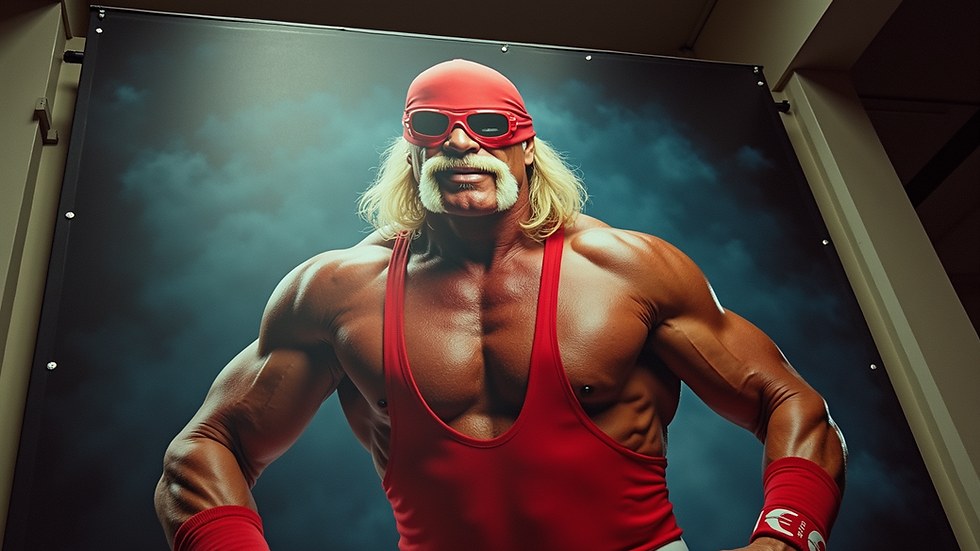Unpacking the True Legacy of Hulk Hogan in Professional Wrestling History
- Ash Brown

- Jul 24, 2025
- 4 min read
Hulk Hogan remains an iconic figure in the history of professional wrestling. His impact goes far beyond the wrestling ring, influencing both the sport and popular culture. From unforgettable catchphrases to his larger-than-life persona, Hogan has left a lasting imprint on the industry. However, discussions about his legacy come with a mix of admiration and controversy. This post will explore the true legacy of Hulk Hogan by examining his contributions, impact, and the challenges he faced throughout his career.
The Rise of a Wrestling Superstar
Hulk Hogan, born Terry Gene Bollea, stepped into the professional wrestling scene in the late 1970s. Early on, he performed in various independent circuits until he gained traction with the World Wrestling Federation (WWF), now known as World Wrestling Entertainment (WWE).
Hogan’s moment of triumph arrived in 1984 when he defeated The Iron Sheik to claim the WWF Championship. This victory launched the "Hulkamania" phenomenon, propelling him to superstardom. Charismatic and physically impressive, Hogan quickly became a fan favorite. He wasn’t just a wrestler; he was a national hero.
This rise coincided with the rapid growth of professional wrestling as a mainstream entertainment form. In fact, attendance at live events surged by up to 30% during this era, thanks in large part to Hogan’s massive popularity. He was one of the first wrestlers to break into mainstream media, landing roles in movies like "Rocky III" and television shows. This paved the way for future wrestlers to pursue similar opportunities beyond the ring.
Hulk Hogan and the 1980s Wrestling Boom
The 1980s is often labeled the golden era of professional wrestling, and Hogan was its shining star. He captivated audiences from children to adults, becoming a household name.
Hogan’s uplifting persona embodied the fight against evil, giving fans an undefeated champion. His famous phrases, including "Hulkamania is runnin' wild," became cultural touchstones, encouraging merchandise sales that exploded during this period. Notably, around 1985, merchandise sales for wrestlers increased by over 50%, largely attributed to Hogan's marketability.
Hogan played a crucial role in transforming professional wrestling into a major cultural event. Major shows like WrestleMania I in 1985 showcased the potential of wrestling to draw large crowds and attract media attention. WrestleMania I alone drew over 19,000 fans to Madison Square Garden, marking a significant milestone in wrestling history.
Transition to WCW and the New World Order
In 1994, Hogan made a significant career change by joining World Championship Wrestling (WCW). This move marked a pivotal shift in wrestling and a challenge to WWF’s dominance.
In 1996, Hogan shocked fans by turning heel, betraying the audience that had loved him. Forming the New World Order (nWo) with Scott Hall and Kevin Nash created new storylines with a darker tone, enabling WCW to gain the upper hand in the Monday Night Wars against WWF.
The nWo storyline changed everything. It allowed for deeper character development and complex narratives, showcasing a side of Hogan that was more unpredictable. This evolution marked a departure from his previous image as an all-American hero, illustrating more nuanced storytelling in the industry.
Contributions Beyond the Ring
Hulk Hogan's influence expands well beyond wrestling. He is often credited with elevating wrestling into popular consciousness through his appearances on various talk shows and reality TV, which introduced the sport to an even wider audience.
Besides his entertainment contributions, Hogan is involved in philanthropic work, especially with organizations helping children. His efforts have positioned him as a role model striving to impact the world positively.
Furthermore, Hogan has been a mentor for younger wrestlers, sharing insights that have proven invaluable for their careers. Wrestlers such as John Cena and Dwayne "The Rock" Johnson have expressed gratitude for Hogan’s influence in their journeys, showing that his legacy continues through new talents.
The Controversies
Despite his many contributions, Hogan’s legacy is marred by controversy. In 2015, racially insensitive remarks made by Hogan surfaced, resulting in his termination from WWE and widespread public backlash.
This incident sparked intense discussions about Hogan’s image and the legacy he had built. Fans and critics debated how to separate his in-ring persona from his real-life actions, raising questions about accountability in the entertainment industry.
Even with these challenges, Hogan’s influence remains significant. The wrestling community continues to discuss redemption, suggesting that public perception can evolve over time.
The Impact on Future Generations
Hulk Hogan’s legacy has established benchmarks for future wrestlers. His success opened doors for others to find success in mainstream media, blurring the lines between wrestling and entertainment.
Hogan's marketing techniques set a precedent for modern wrestlers. Today’s stars like Becky Lynch and Roman Reigns utilize similar strategies to build their brands both within and outside the wrestling world. His impact can be seen in their ability to connect with audiences and generate merchandise sales, which have reached billions over the years.
Furthermore, Hogan's journey has inspired numerous biographies and documentaries, enriching the understanding of professional wrestling history. His story exemplifies the rise-and-fall narrative of sports icons, serving as a vital case study for aspiring wrestlers and entertainers.
Reassessment of Legacy
In recent years, fans have begun to reassess Hogan’s legacy in wrestling. Many seek to distinguish the man from the myth, recognizing the impact he had in popularizing the sport during its peak.
This reassessment highlights the nuances of public figures. It compels fans to confront less comfortable truths while acknowledging the joy and excitement Hogan brought to countless fans over generations.
Discussions about Hogan's legacy reflect broader societal dialogues around accountability and growth. As wrestling evolves, so does the understanding and discourse surrounding its most influential figures.
Final Thoughts
Hulk Hogan's multifaceted legacy in professional wrestling is undeniable. He played a vital role in elevating wrestling to new heights while grappling with challenges that invite broader discussions around legacy and redemption.
While his influence on the wrestling industry is significant, the controversies he faced remind us that every legacy is a mix of both triumphs and failures. Hogan's story reflects the complexities of entertainment—a blend of success, struggle, and the quest for redemption.
As fans continue to appreciate Hogan’s contributions, it is essential to embrace the lessons his career has provided. His legacy transcends the titles won or the matches fought; it serves as a testament to the unifying power of entertainment and the ongoing conversations it inspires.

































Comments